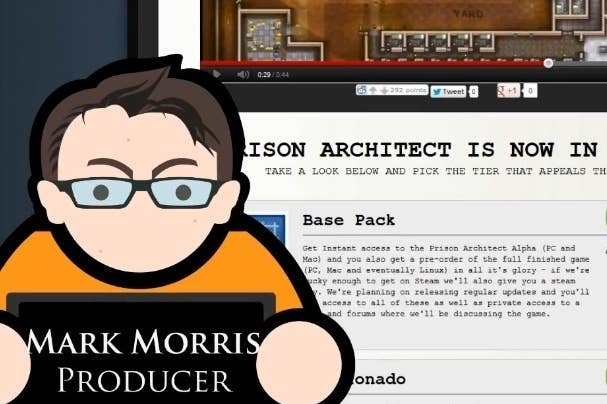Introversion: Selling alphas "the way forward for indie devs"
Prison Architect developer on adapting to the changing role of indies in the market
Introversion was indie before indie was in. The developer of Darwinia and Prison Architect was founded in 2001, long before Kickstarter, Steam, digital distribution on consoles, and everything else that would turn the world of independent game development upside-down. As co-founder Mark Morris told GamesIndustry International, what used to be hard has become easy, and what used to be easy is suddenly quite hard.
"A decade ago you had to fight to get in the room with key decision makers who would make or break your game," Morris said. "Once those relationships were established, it was easy-ish to make money from selling games. Back in those days marketing was easy, because there weren't many indie devs and Introversion could trade on the fact that we were 'living the dream.' Now being an indie is much more common, so getting press coverage is harder, but the routes to market are no longer controlled by a few key people and are significantly more ubiquitous."
With lower barriers to entry and a more competitive market for gamers' attention, Introversion has changed the way it does business. The experience of producing Darwinia+ on Xbox 360, disappointing sales of Multiwinia, and the scuttling of Subversion some five years after work began on the title necessitated adaptations.
"We're much more agile than we once were. Gone is the big office and full time members of staff. It's just me and Chris now supported by freelancers"
Mark Morris
"We're much more agile than we once were," Morris explained. "Gone is the big office and full time members of staff. It's just me and Chris now supported by freelancers. We're focused on getting Prison Architect released on PC and we've been amazed by the response to our tiered store. We won't develop for Microsoft or Sony again, because it took too long and sapped our resources. We make Original Video Games and ports need to be handled by teams that specialize in that. We have a very different mindset to the one that drove us to take Darwinia to the 360 in 2005 and we're a lot more savvy now."
The tiered store Morris referred to is one key part of the plan. Introversion is currently selling access to an in-development alpha version of Prison Architect through its own website. Those who pay $30 will get the finished game when it is ready, as well as the current build, bugs and all.
However, Introversion is also offering Kickstarter-style reward tiers for fans who want to contribute a little more to the game's development early on. For $50, a player can have one of the final game's prisoners named after him or her. For $1,000, they can design one of the game's five prison wardens. (Or at least they could have; Introversion removed that option after accidentally selling the tier to six different backers.) The approach has yielded positive results so far, with 37,800 copies of the game sold and more than $1.2 million raised to fund the game's ongoing development.
"Selling Alpha access is definitely the way forward for indie devs," Morris said. "We're by no means the first to try it, but I think we've hit on a nice hybrid that borrows from Kickstarter and crowd-funding ideas. We really wanted to be public about how well it has worked and the breakdown of the different tiers to help other devs to decide how to structure their own approach to selling their games."
"We just can't afford to develop for iPad at the moment, because the margins are just not high enough"
Mark Morris
One trend Introversion is less excited about is the rush to mobile and tablet development.
"We already have Uplink out on iPad and Android and we've been happy with the volumes, but not the revenues," Morris said. "We just can't afford to develop for iPad at the moment, because the margins are just not high enough. I'd love to see Apple addressing this, but I think they are pretty happy with their market place."
While he is convinced that tablets are here to stay and expressed an interest in developing on them, Morris said it's just not worth it for Introversion unless the price points for games start getting higher.
This is the first in a series of interviews GamesIndustry International has planned with independent developers on the changing role of indies in the industry landscape.

